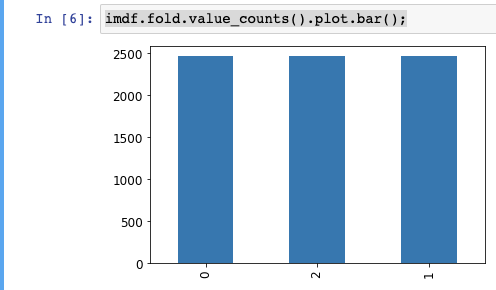Hi Community,
As a part of my learning journey I wanted to implement KFold cross validation based on the chapter 1 dogs vs cats example. However, I stuck with the issue, that occurs quite randomly which is the TypeError: 'float' object is not callable error.
Here’s my code. First I put all image paths to the data frame to compute folds using StratifiedKFold.
from fastai.vision.all import *
from sklearn.model_selection import StratifiedKFold
path = untar_data(URLs.PETS)/'images'
imdf = pd.Series(get_image_files(path), name='path').to_frame()
imdf.head()
k = 3 # try 3 folds
strat_kfold = StratifiedKFold(n_splits=k, shuffle=True)
imdf['fold'] = -1
for i, (_, test_index) in enumerate(strat_kfold.split(imdf.path.values, imdf.fold.values)):
imdf.iloc[test_index, -1] = i
imdf.head()
Files are distributes across folds

Distribution shows equal files distribution
imdf.fold.value_counts().plot.bar();

My training loop looks like below
def is_cat(fpath):
return Path(fpath).name[0].isupper()
error_rates = []
for i in range(k):
print(f'Fold ({i})')
dls_fold = DataBlock(
blocks=(ImageBlock, CategoryBlock),
get_x=ColReader('path'),
get_y=compose(ColReader('path'), is_cat),
splitter=IndexSplitter(imdf[imdf.fold == i].index),
item_tfms=Resize(224)).dataloaders(imdf)
learn = cnn_learner(dls_fold, resnet34, metrics=error_rate)
learn.fine_tune(1)
loss, error_rate = learn.validate()
error_rates.append(error_rate)
I’m not even trying to do an average of fold error_rates at this stage, because getting the error like below. However, fist time it happened at second fold, but most of the cases if I try to rerun it it fails on first fold.
I was checking the datasets in folds and it seems to be fine
Anyone have an idea what is wrong with it ?
The error I’m getting is:
---------------------------------------------------------------------------
TypeError Traceback (most recent call last)
<ipython-input-8-1ffe3e8bc2b8> in <module>
11
12 learn = cnn_learner(dls_fold, resnet34, metrics=error_rate)
---> 13 learn.fine_tune(1)
14 loss, error_rate = learn.validate()
15 error_rates.append(error_rate)
/opt/conda/envs/fastai/lib/python3.8/site-packages/fastai/callback/schedule.py in fine_tune(self, epochs, base_lr, freeze_epochs, lr_mult, pct_start, div, **kwargs)
155 "Fine tune with `freeze` for `freeze_epochs` then with `unfreeze` from `epochs` using discriminative LR"
156 self.freeze()
--> 157 self.fit_one_cycle(freeze_epochs, slice(base_lr), pct_start=0.99, **kwargs)
158 base_lr /= 2
159 self.unfreeze()
/opt/conda/envs/fastai/lib/python3.8/site-packages/fastai/callback/schedule.py in fit_one_cycle(self, n_epoch, lr_max, div, div_final, pct_start, wd, moms, cbs, reset_opt)
110 scheds = {'lr': combined_cos(pct_start, lr_max/div, lr_max, lr_max/div_final),
111 'mom': combined_cos(pct_start, *(self.moms if moms is None else moms))}
--> 112 self.fit(n_epoch, cbs=ParamScheduler(scheds)+L(cbs), reset_opt=reset_opt, wd=wd)
113
114 # Cell
/opt/conda/envs/fastai/lib/python3.8/site-packages/fastai/learner.py in fit(self, n_epoch, lr, wd, cbs, reset_opt)
203 self.opt.set_hypers(lr=self.lr if lr is None else lr)
204 self.n_epoch = n_epoch
--> 205 self._with_events(self._do_fit, 'fit', CancelFitException, self._end_cleanup)
206
207 def _end_cleanup(self): self.dl,self.xb,self.yb,self.pred,self.loss = None,(None,),(None,),None,None
/opt/conda/envs/fastai/lib/python3.8/site-packages/fastai/learner.py in _with_events(self, f, event_type, ex, final)
152
153 def _with_events(self, f, event_type, ex, final=noop):
--> 154 try: self(f'before_{event_type}') ;f()
155 except ex: self(f'after_cancel_{event_type}')
156 finally: self(f'after_{event_type}') ;final()
/opt/conda/envs/fastai/lib/python3.8/site-packages/fastai/learner.py in _do_fit(self)
194 for epoch in range(self.n_epoch):
195 self.epoch=epoch
--> 196 self._with_events(self._do_epoch, 'epoch', CancelEpochException)
197
198 def fit(self, n_epoch, lr=None, wd=None, cbs=None, reset_opt=False):
/opt/conda/envs/fastai/lib/python3.8/site-packages/fastai/learner.py in _with_events(self, f, event_type, ex, final)
152
153 def _with_events(self, f, event_type, ex, final=noop):
--> 154 try: self(f'before_{event_type}') ;f()
155 except ex: self(f'after_cancel_{event_type}')
156 finally: self(f'after_{event_type}') ;final()
/opt/conda/envs/fastai/lib/python3.8/site-packages/fastai/learner.py in _do_epoch(self)
189 def _do_epoch(self):
190 self._do_epoch_train()
--> 191 self._do_epoch_validate()
192
193 def _do_fit(self):
/opt/conda/envs/fastai/lib/python3.8/site-packages/fastai/learner.py in _do_epoch_validate(self, ds_idx, dl)
185 if dl is None: dl = self.dls[ds_idx]
186 self.dl = dl
--> 187 with torch.no_grad(): self._with_events(self.all_batches, 'validate', CancelValidException)
188
189 def _do_epoch(self):
/opt/conda/envs/fastai/lib/python3.8/site-packages/fastai/learner.py in _with_events(self, f, event_type, ex, final)
152
153 def _with_events(self, f, event_type, ex, final=noop):
--> 154 try: self(f'before_{event_type}') ;f()
155 except ex: self(f'after_cancel_{event_type}')
156 finally: self(f'after_{event_type}') ;final()
/opt/conda/envs/fastai/lib/python3.8/site-packages/fastai/learner.py in all_batches(self)
158 def all_batches(self):
159 self.n_iter = len(self.dl)
--> 160 for o in enumerate(self.dl): self.one_batch(*o)
161
162 def _do_one_batch(self):
/opt/conda/envs/fastai/lib/python3.8/site-packages/fastai/learner.py in one_batch(self, i, b)
176 self.iter = i
177 self._split(b)
--> 178 self._with_events(self._do_one_batch, 'batch', CancelBatchException)
179
180 def _do_epoch_train(self):
/opt/conda/envs/fastai/lib/python3.8/site-packages/fastai/learner.py in _with_events(self, f, event_type, ex, final)
154 try: self(f'before_{event_type}') ;f()
155 except ex: self(f'after_cancel_{event_type}')
--> 156 finally: self(f'after_{event_type}') ;final()
157
158 def all_batches(self):
/opt/conda/envs/fastai/lib/python3.8/site-packages/fastai/learner.py in __call__(self, event_name)
130 def ordered_cbs(self, event): return [cb for cb in sort_by_run(self.cbs) if hasattr(cb, event)]
131
--> 132 def __call__(self, event_name): L(event_name).map(self._call_one)
133
134 def _call_one(self, event_name):
/opt/conda/envs/fastai/lib/python3.8/site-packages/fastcore/foundation.py in map(self, f, gen, *args, **kwargs)
177 def range(cls, a, b=None, step=None): return cls(range_of(a, b=b, step=step))
178
--> 179 def map(self, f, *args, gen=False, **kwargs): return self._new(map_ex(self, f, *args, gen=gen, **kwargs))
180 def argwhere(self, f, negate=False, **kwargs): return self._new(argwhere(self, f, negate, **kwargs))
181 def filter(self, f=noop, negate=False, gen=False, **kwargs):
/opt/conda/envs/fastai/lib/python3.8/site-packages/fastcore/basics.py in map_ex(iterable, f, gen, *args, **kwargs)
605 res = map(g, iterable)
606 if gen: return res
--> 607 return list(res)
608
609 # Cell
/opt/conda/envs/fastai/lib/python3.8/site-packages/fastcore/basics.py in __call__(self, *args, **kwargs)
595 if isinstance(v,_Arg): kwargs[k] = args.pop(v.i)
596 fargs = [args[x.i] if isinstance(x, _Arg) else x for x in self.pargs] + args[self.maxi+1:]
--> 597 return self.func(*fargs, **kwargs)
598
599 # Cell
/opt/conda/envs/fastai/lib/python3.8/site-packages/fastai/learner.py in _call_one(self, event_name)
134 def _call_one(self, event_name):
135 assert hasattr(event, event_name), event_name
--> 136 [cb(event_name) for cb in sort_by_run(self.cbs)]
137
138 def _bn_bias_state(self, with_bias): return norm_bias_params(self.model, with_bias).map(self.opt.state)
/opt/conda/envs/fastai/lib/python3.8/site-packages/fastai/learner.py in <listcomp>(.0)
134 def _call_one(self, event_name):
135 assert hasattr(event, event_name), event_name
--> 136 [cb(event_name) for cb in sort_by_run(self.cbs)]
137
138 def _bn_bias_state(self, with_bias): return norm_bias_params(self.model, with_bias).map(self.opt.state)
/opt/conda/envs/fastai/lib/python3.8/site-packages/fastai/callback/core.py in __call__(self, event_name)
42 (self.run_valid and not getattr(self, 'training', False)))
43 res = None
---> 44 if self.run and _run: res = getattr(self, event_name, noop)()
45 if event_name=='after_fit': self.run=True #Reset self.run to True at each end of fit
46 return res
/opt/conda/envs/fastai/lib/python3.8/site-packages/fastai/learner.py in after_batch(self)
455 if len(self.yb) == 0: return
456 mets = self._train_mets if self.training else self._valid_mets
--> 457 for met in mets: met.accumulate(self.learn)
458 if not self.training: return
459 self.lrs.append(self.opt.hypers[-1]['lr'])
/opt/conda/envs/fastai/lib/python3.8/site-packages/fastai/learner.py in accumulate(self, learn)
377 def accumulate(self, learn):
378 bs = find_bs(learn.yb)
--> 379 self.total += learn.to_detach(self.func(learn.pred, *learn.yb))*bs
380 self.count += bs
381 @property
TypeError: 'float' object is not callable
